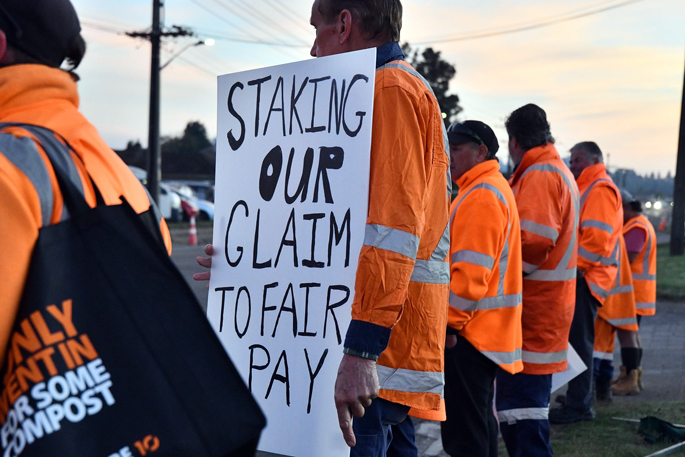Rotorua’s gardeners and grave diggers, who went on strike for five days, will soon receive a living wage.
Seventy-five employees of Rotorua Lakes Council-controlled organisation InfraCore swapped their tools for protest signs after eight months of failed negotiations.
They work in the parks, cemeteries and the provision of water services departments.
InfraCore chief executive Regan Fraser previously said their union’s expectations surpassed what the company could afford, but today said the new agreement would not strain its budget further.
Fraser said there were “constructive discussions” and the new agreement benefitted all parties.
This included how employees would receive, as a minimum, the equivalent of the living wage - $26 an hour.
“We can now focus on what we do best: providing quality services that contribute to making our district a safe, clean, and beautiful place to live, work, and play.”
Fraser said service delivery was “inevitably impacted” during the strike action, which resulted in a “modest backlog of work”.
“We appreciate everyone’s patience and are committed to quickly resuming our high service standards.”
 Seventy-five InfraCore workers went on strike in a bid for better pay. Photo / Laura Smith.
Seventy-five InfraCore workers went on strike in a bid for better pay. Photo / Laura Smith.
Discussions began in June last year.
Before the strike action began on March 22 Fraser said it had been able to offer a 5 per cent pay increase but this was turned down.
Amalgamated Workers Union represented 59 of the striking workers. Bay of Plenty organiser Toni Smith previously said some had 10 years’ experience and were paid $23.65 an hour.
“Trainees at other local councils are better paid, and every other local body in the region pays a living wage of a minimum of $26 an hour.”
On the agreement, Smith said the union membership could be “so very proud of themselves”.
“None of this would have been possible without them collectively making the decision to stand strong together and have their voice heard over the five-day strike.”
 Amalgamated Workers Union New Zealand Bay of Plenty organiser Toni Smith. Photo / Andrew Warner.
Amalgamated Workers Union New Zealand Bay of Plenty organiser Toni Smith. Photo / Andrew Warner.
Smith also acknowledged community support that she said came from local contractors, emergency services, council workers and other unions’ delegates and organisers.
“Was so good to see and hear the support for such an important issue in addressing the high cost of living in our communities.”
First Union represented 16 workers. Organiser Phil Graham previously said the cost of living would create more poverty and hardship the living wage would ease.
Council’s infrastructure and environment group manager Stavros Michael said there were no major issues it could not address during the strike period and would continue to work with InfraCore to return to business-as-usual services.
LDR is local body journalism co-funded by RNZ and NZ On Air.




1 comment
Unsupportable
Posted on 03-04-2024 11:32 | By Let's get real
Councils are one of the few employment groups that have signed up to the Green initiative of a "living wage".
As I understand it now, we have different pay structures within our bus companies, particularly around driving school children to different schools.
I'm told that if you happen to be driving a school bus to a public school, the transport cost comes from regional council and you get about $2 an hour more than if you're doing exactly the same job for a private school such as Aquinas or Bethlehem college.
All of our Councils are regarded as cash cows, as there appears to be absolutely no restraint on spending.
We have just seen the annual council extravaganza to empty the coffers before the next lot of free money lands on the managers desk. How about not spending it.
Leave a Comment
You must be logged in to make a comment.